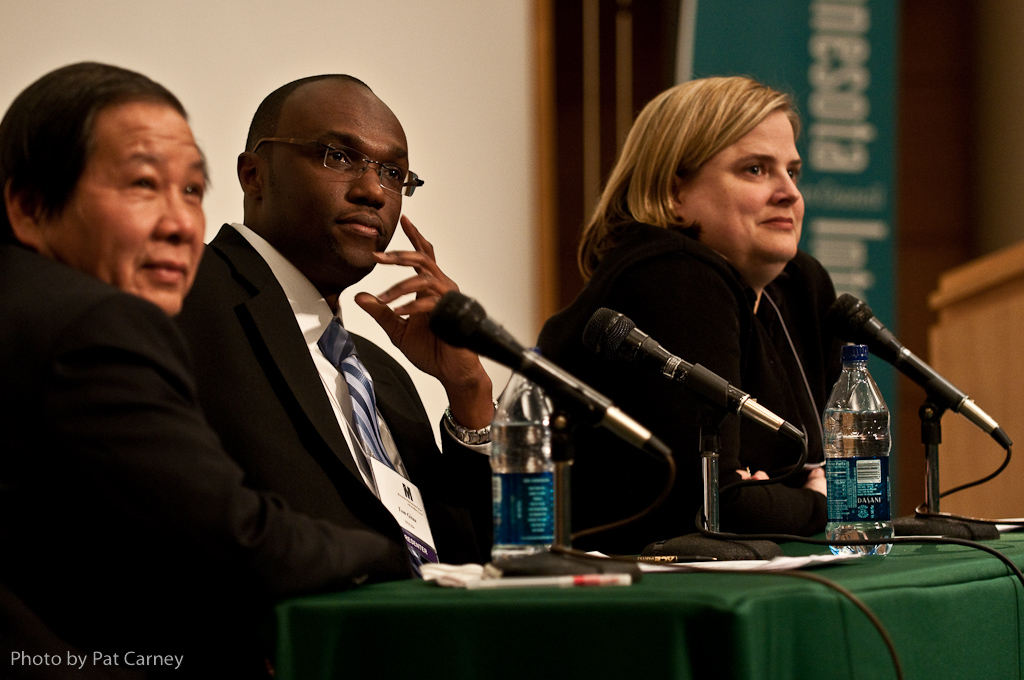
The story of Somali youth who vanished from the Twin Cities, possibly to fight alongside jihadists in their home country, is transforming the normally passionate and sometimes pugilistic debates at Minneapolis coffee shops into quieter introspection.
Now a recurring topic of conversation among Somalis is “reconstructing the community’s tainted image,” said Dahir Awaleh, a 47-year-old small-business owner who frequents the popular Starbucks on Minneapolis’ Riverside Avenue.
“In Minnesota, Somalis are increasingly associated with terrorists,” he lamented, sipping his coffee. “Businesses are raided. Friends and family members are being interrogated by law enforcement agencies. Mosques are under surveillance.”
On a recent Saturday afternoon – a day when the shop’s customers are almost entirely Somali – Awaleh’s remarks drew quick nods from the half dozen Somali men he sat with. They said the unknown number of Somali youth who left the Twin Cities, among other places, to fight in Somalia, are casting the community in a negative light, thanks to alarmist individuals and sensational news media.
“Individuals anointed by the news media as leaders are capitalizing on this tragedy,” said Mukhtar Osman, an engineering student at the University of Minnesota, who was recently held at the airport for hours when he returned from a family visit in Sweden. “My detention is a direct impact of reckless remarks made by so-called community leaders who claim that Somali youth may strike U.S. targets if they return. There’s no shred of evidence for this.”
Osman’s assertion is backed up by law enforcement. Andrew Liepman, deputy director of intelligence at the National Counterterrorism Center, recently told a Senate panel that his agency does “not have a credible body of reporting right now that leads us to believe that these American recruits are being trained and instructed to come back to the U.S. for terrorist acts.”
Self-radicalized?
Though much of the blame for the missing Somali youth has been directed at local mosques, there are signs that the youth, galvanized by the 2006 Ethiopian invasion of Somalia, may have radicalized themselves. Ethiopia’s invasion, widely believed to be supported by the Bush administration, “has attracted the rapt attention of Somali Diaspora communities and heightened their nationalistic sentiments,” Liepman testified before the Senate Homeland Security and Governmental Affairs Committee in March.
Extremist elements like al-Shabaab, a Somali group designated a terrorist organization by the U.S., have exploited the bitter reaction to the Ethiopian invasion and compelled young, despondent Somali men to join their ranks.
As a result, some of the men may have sold assets or worked overtime to pay the airfare to Somalia. A source close to one of the missing young men, Abdisalam, also known as “Bullet-head,” said that he sold his car just a few weeks before he left last year. At least a handful of the vanished youth have had decent paying jobs.
Earlier this month, a young man who uses the pseudonym “Abu Muslim” and claims to be a 23-year-old from Minneapolis, told a local radio station in Somalia that no one had recruited him to fight.
“I chose to join the cause of jihad in my country,” he said in broken Somali, a clear sign that he grew up in the Diaspora.
Also this month, al-Shabaab released a sophisticated 31-minute propaganda video designed to appeal to Diaspora Somalis. The star of the video is a Caucasian man who calls himself “Abu Mansoor,” the American. He commands an English-speaking unit of about two-dozen men, thought to be Somalis bred in the West. A Somali member of the unit, whose face is obscured, says in an American accent that he never thought he’d be leaving the comfort of home to carry an AK-47 in defense of his country.
‘Under Siege’
Whether the missing youth radicalized and financed themselves, or whether certain individuals within the community have actively recruited them, the negative impact of the story can hardly be overstated.
Two weeks ago, FBI agents raided the Minneapolis offices of money transfer business — a key lifeline for millions of Somalis who depend on monthly remittances from loved ones in the Diaspora. Although the offices were not closed, the episode was another blow to a community shaken by fear, confusion and uncertainty.
Special agent E.K. Wilson of the Minneapolis FBI said the raids were part of an ongoing investigation, though he wouldn’t confirm or deny if they were related to the vanished youth.
That uncertainty surrounding the subject of the investigation is bedeviling the community. Returning to Somalia for any reason – marriage, traditional medical treatments or a just to visit family – is cause for intense scrutiny.
“Even people who tried to take vacation from their jobs were asked by their superiors if they were going to Somalia for jihad,” said Abdi Sheikh-Osman, an adjunct professor of law at the University of Minnesota. “Somalis fled a country where the government was the principal enemy. Now they face a similar situation. The community is effectively under siege.”
Back at the Starbucks, many in the crowd said they know countless friends and family members who have been interviewed by the FBI. They also said the news of a grand jury being convened to investigate the matter, while a welcome step, has increased anxiety among them.
Al-Shabaab in trouble?
Ethiopia’s withdrawal from Somalia late last year, a crucial recruiting tool for al-Shabaab, has probably hurt its bottom line, experts said. Left with a popular Islamist as the president of the nascent Government of National Unity and an unfriendly clannish society, al-Shabaab will inevitably see its membership dwindle, experts believe.
“The Shabaab is already in trouble, thanks to the Ethiopian withdrawal,” wrote Ken Menkhause, a Somalia scholar at Davidson College in North Carolina. “It also runs the risk of having its most powerful ideological card – Somali nationalist, anti-foreigner sentiments – turned against it, as domestic adversaries accuse it of being a puppet of foreign jihadists bringing more trouble to the country.”
If such scenario bears fruit, the story of the vanished Somali youth may have reached its climax.
This story first appeared in the Minnesota Independent
About Abdirahman Aynte
Abdi Aynte was a news reporter for Mshale in his early journalism years. After a stint at Mshale, he moved on to the BBC, Voice of America and eventually relocated to Doha to join Al Jazeera. After leaving Al Jazeera, Aynte moved back to his homeland of Somalia to become the first Director of newly formed non-partisan Heritage Institute for Policy Studies (HIPS).







